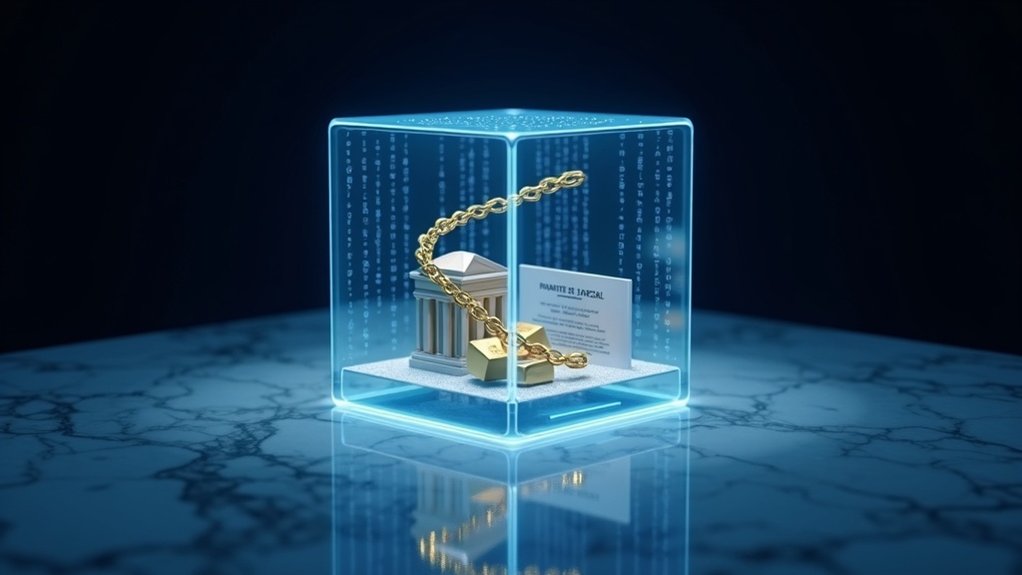Security tokens are digital assets representing ownership of real-world items on blockchain. Unlike their wild crypto cousins, these tokens follow securities laws and offer actual financial rights—equity, debt, or revenue shares. They’re governed by smart contracts that handle the boring stuff automatically. Think digital stocks, but with less paperwork and more code. They make traditionally illiquid investments accessible through tokenization. The regulatory compliance isn’t sexy, but it’s what separates legitimate innovation from crypto’s wilder side.
The crypto revolution isn’t just about Bitcoin and meme coins.
Behind the scenes, a more regulated innovation is quietly reshaping traditional finance: security tokens.
These digital assets represent ownership or rights to real-world assets, all recorded on a blockchain.
No hype, just hard financial rights – equity, debt, dividends, or claims to revenue streams.
Security tokens deliver tangible financial rights without the crypto hype – real equity, debt, and revenue claims on the blockchain.
And yes, the government definitely cares about these.
Unlike their wilder cousins (looking at you, utility tokens), security tokens come with actual legal rights.
They’re governed by smart contracts that enforce rules automatically.
Transfer restrictions? Coded in. Dividend payments? Automated.
The whole system operates with less paperwork but more code.
And regulators are watching. Closely.
These tokens come in various flavors.
Equity tokens are basically digital stocks.
Debt tokens represent bonds or loans.
Revenue-share tokens entitle holders to a cut of the money.
Some are backed by physical assets like real estate or art.
Can’t afford a whole building? Buy a fraction as a token. Simple.
The asset tokenization process enables unprecedented access to traditionally illiquid investments while maintaining regulatory compliance.
The technical infrastructure is getting sophisticated.
Standards like ERC-1400 and ST-20 build compliance directly into the tokens.
Platforms like Polymath and Securitize handle the dirty work of issuance and regulatory compliance.
Nothing happens without proper KYC and AML checks.
According to established frameworks, security tokens are classified using the Howey Test which determines if there’s an investment in a common enterprise.
Security tokens must comply with federal securities regulations to protect investors from market risks and fraudulent activities.
Freedom from regulation isn’t part of this pitch.
Regulation is inescapable here.
The Howey Test determines if something’s a security in the US, and these tokens are designed to pass it deliberately.
Cross-border complexity is a nightmare.
Rules change constantly.
Not exactly the “code is law” libertarian dream, is it?
The upside? Investors get traditional rights with modern efficiency.
Dividends arrive automatically.
Traditionally illiquid assets become tradable.
Settlement times shrink from days to minutes.
Market hours? What market hours? Trading never stops.
Security tokens won’t make anyone rich overnight.
They aren’t meant to.
They’re the boring, compliant face of crypto that traditional finance might actually accept.
Revolution through evolution.
Not sexy, but potentially significant.
Frequently Asked Questions
How Are Security Tokens Regulated Across Different Countries?
Security tokens face different regulatory frameworks globally.
The US classifies them under securities law using the Howey Test, requiring SEC registration or exemptions.
EU countries apply MiFID II or MiCA provisions.
The UK treats them as financial instruments under FCA oversight.
Singapore’s MAS regulates tokens meeting Securities and Futures Act definitions.
Switzerland uses a substance-over-form approach through FINMA.
All jurisdictions demand some combination of disclosure requirements, trading venue regulations, and KYC/AML compliance.
No surprise—it’s complicated.
Can Security Tokens Be Stored in Regular Cryptocurrency Wallets?
Security tokens can technically be stored in regular crypto wallets that support the underlying token standard (like ERC-20).
But there’s a catch. Regular wallets lack compliance features for whitelisting, transfer locks, and investor verification.
Holding tokens this way might not satisfy legal requirements or enable proper functionality.
Practically speaking? Specialized security token wallets or regulated custodians are needed for full compliance and to access dividends, voting rights, and secondary trading capabilities.
Basic wallets? Just glorified key holders.
What Fees Are Associated With Security Token Transactions?
Security token transactions come with a stack of fees.
On-chain network fees vary by blockchain and congestion levels.
Custody providers and broker-dealers tack on their own charges.
Then there’s the regulatory costs – KYC/AML verification isn’t free.
Don’t forget marketplace and exchange fees for trading.
Layer-2 solutions can lower some costs, but the total price tag often exceeds regular crypto transactions.
No surprise there – compliance costs money.
How Do Security Tokens Handle Dividend Distributions?
Security tokens handle dividends through automated smart contracts.
They use snapshot mechanisms to record token holder balances at specific timestamps, determining who gets paid what.
Distribution happens via ERC-20 tokens (often stablecoins) held in contract vaults until claim time.
Not simple though.
Regulatory constraints mean KYC checks, eligibility rules, and sometimes traditional intermediaries still get involved.
Gas costs can make small distributions expensive.
The whole system balances automation with compliance requirements – not always elegantly.
Can Security Tokens Be Converted Back to Traditional Securities?
Yes, security tokens can be converted back to traditional securities.
The process depends on regulatory frameworks and the token’s legal structure.
Conversion typically involves custodial reconciliation where transfer agents update the issuer’s registry after burning tokens.
Smart contracts often include redemption clauses for this purpose.
It’s not always smooth sailing though.
Regulatory uncertainty, jurisdictional differences, and operational complexity create real barriers.
Conversion pathways exist, but they’re still evolving.
The infrastructure just isn’t fully mature yet.









